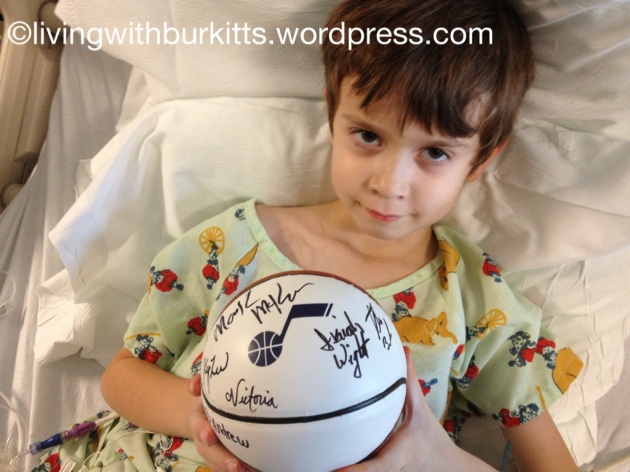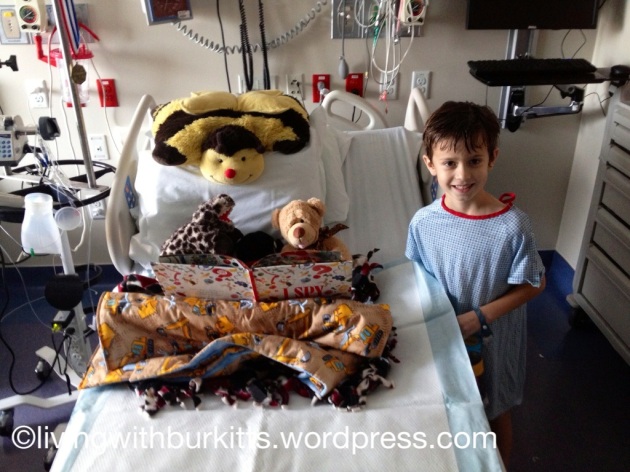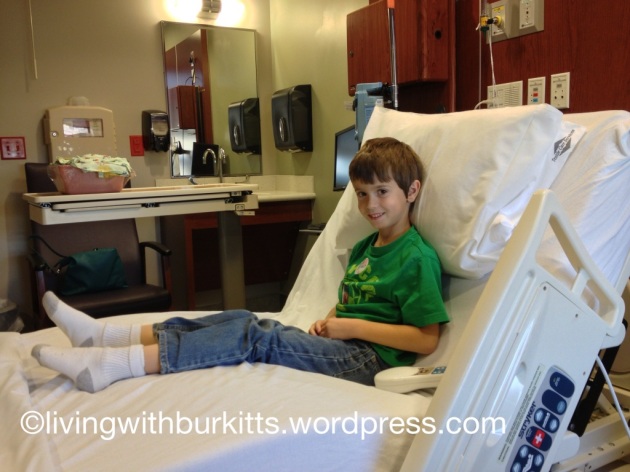
Fridge full of I.V. meds
Between morning piano lessons for Madeline and morning I.V. antibiotics for Andrew, today started early. It feels strange to mix the normal parts of our old life with the adjustments of our new life. It’s kind of like bringing a newborn home from the hospital. It’s a big adjustment, but being home feels right this time.
The newborn comparison works well for the amount of sleep Chris and I got last night. We still have to figure out the logistics of administering I.V. antibiotics at 10:00 p.m. and 6:00 a.m. and helping Andrew get his bag and pump to the bathroom several times each night. We have a new plan that just might work.
Andrew ate two breakfasts today, so that will make his nutritionist happy. He is happy to be home and is especially happy when he is untethered from the I.V. pump.
Since our day-to-day doings are getting to be boring (though still busy), I thought I’d share a few useful tips I picked up at the hospital.
1. Bleach clean is best
There are lots of cleaning products to choose from, but the one that the hospital used to clean Andrew’s room twice each day was common bleach. It’s the only thing that kills a nasty diarrhea bug, nicknamed “C. diff”, common among cancer kids. Anti-bacterial wipes or alcohol prep pads are a good alternative for electronics or anything else that bleach might ruin.

Turn pills to liquid meds
2. How to get little kids to swallow pills
This was never a problem for us before, because the only medicines Andrew ever took were liquids. Now, pills are on his list and he refuses to even try to swallow them. Here’s the solution: crush the pill in a medicine cup with the end of a butter knife. Add a little yummy, syrupy liquid that the child will like. Try snow cone or chocolate syrups. Serve it from the cup or pull it into a syringe.
3. Plastic medical tape works on walls
When I was looking for something to hang a Get Well poster from Andrew’s kindergarten class at the hospital, the nurse handed me the same plastic tape they use to tape gauze over wounds. It’s as gentle on painted walls as it is on skin, and holds reasonably well. It also tears easily in nice, straight lines.

Transpore tape
4. Plastic bins have many uses
Anyone who has ever spent time in a hospital probably has at least one of these pink bins around the house. In the past, they have primarily served as our vomit buckets. I have also used them for pre-soaking stained kids’ clothing. We now have about half a dozen of them and I am using them to store and organize all of Andrew’s medical supplies.
5. Home germs are not as scary as hospital germs
Andrew had lots of mysterious infections at the hospital, but since they were bugs that were living inside his intestine before we left home, our Infectious Disease team wasn’t terribly worried. It’s the unusual bacteria that finds its way into hospitals you should be scared of. So, even with an immune-compromised kid, I don’t need to mop the walls with disinfectant every day like my favorite hospital housekeeper did. Phew!
6. Use common sense
It’s easy to become overwhelmed by all the details of Andrew’s care and treatment. The advice I appreciated most was to use common sense. If anything doesn’t look right or feel right, ask more questions.
7. Nothing replaces good hand washing
Visitors entering the cancer unit at Primary Children’s Medical Center are required to wash their hands before entry. Despite gallons of bleach and advanced antibiotics, hand washing is still the best way to keep bad bacteria at bay. Anti-bacterial gel is a good alternative in a pinch, but nothing beats good old soap and warm water.
8. Think about doorknobs and light switches
Our tech came through our room every afternoon and bleach wiped all of the “touch points”. Think door handles, light switches, telephone, remote control, bed rails, etc. You don’t need to be paranoid at home, but these are prime spots for collecting and distributing germs. I didn’t think of cleaning them often before.

Playing with LEGOS
9. You can clean LEGOS in the dishwasher
That’s how ICS keeps their LEGOS clean enough for cancer patients to pass around. Use a mesh bag to keep little pieces from getting lost. This gee-whiz tip is probably not necessary for ordinary families with ordinary immune systems, but if your LEGOS have been around a few years and are feeling a little grubby…
I’m sure some of you have other suggestions from your hospital experience. What other fun things can you do with hospital supplies?

















